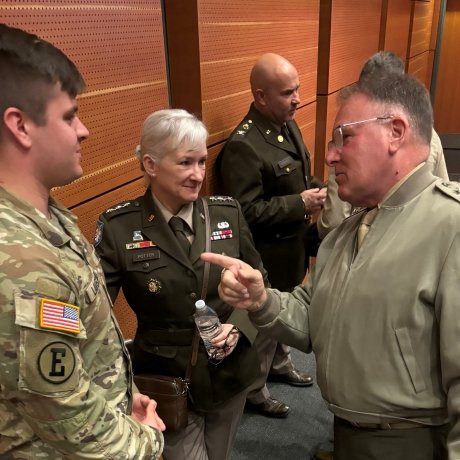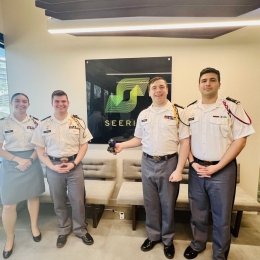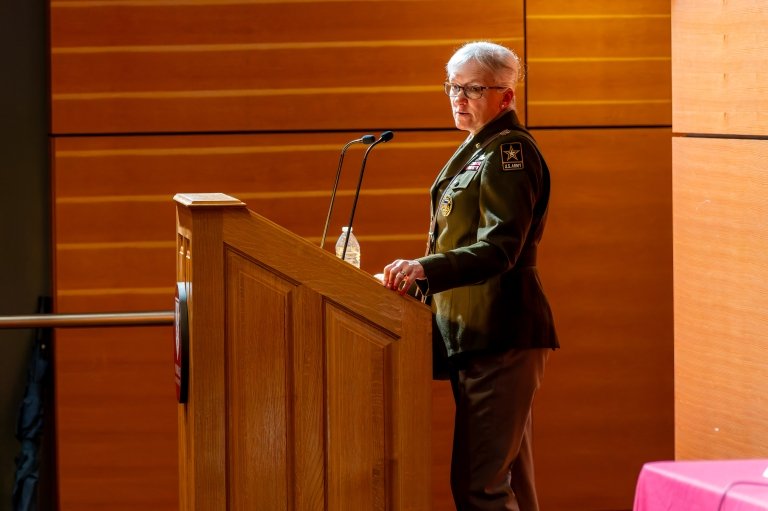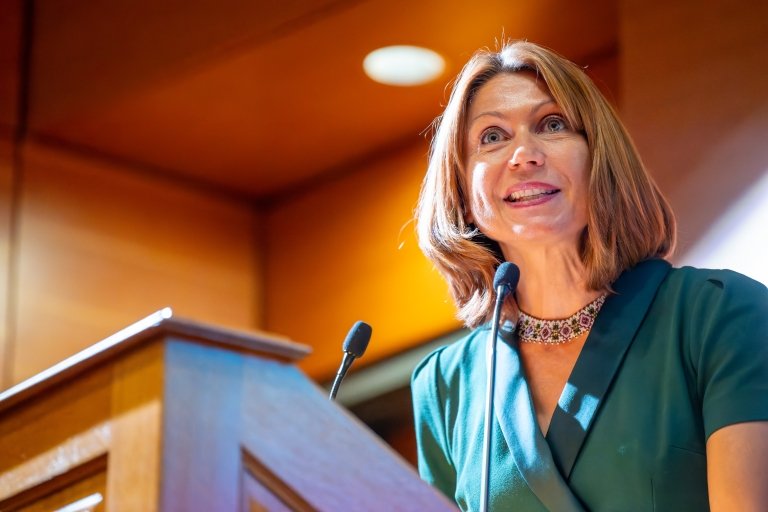21st Century Fog of War: Information Warfare and the Battle for Perception
Norwich University hosts its 30th annual Military Writers' Symposium and awards Mariana Budjeryn the 2024 Colby Award, making her the first woman to receive the honor.

Carl von Clausewitz, the Prussian General and military strategist, coined the term “fog of war” in his book “On War” in the 1800s, in which he describes the uncertainty of information on the battlefield leading to difficult, critical, and time sensitive wartime decisions.
During the recent Military Writer’s Symposium, Norwich University welcomed subject matter experts, those currently serving in the field, and some of the world’s leading military writers to discuss this year’s focus, “Perception Wars: The Battle to Control Reality.” Information warfare, cognitive influence, influence operations, deception operations, misinformation, and disinformation have created a new type of fog of war which extends from the traditional battlefield into every level of society around the world.
LTG Laura Potter, Director of the Army Staff, was the keynote speaker to begin the 30th annual Military Writers’ Symposium. She earned her commission in the Military Intelligence Corps in 1989, and the Distinguished Military Graduate of Dickinson College, Carlisle, Pennsylvania, was a double major in both Russian and Spanish. She holds a master’s degree from Georgetown University’s School of Foreign Service, Center for Eurasian, Russian, and East European Studies, and a Master of Arts in National Security and Strategic Studies from the Naval War College.
During her insightful discussion, LTG Potter commented how the world has enough firepower to destroy itself multiple times over, but one of the most dangerous weapons we currently face are those of direct disinformation, or the more subtle misinformation. Our adversaries tactically use these to create a perception war, truly a battle to control reality. It now reaches everyone with a connected device, users of social media, and those who watch or read traditional media.
“It is an alarm bell that needs to be sounded in our educational departments,” said LTG Potter. “Our adversaries have more foot soldiers than we do in this conflict.” It is crucial to augment our ranks and broaden our educational endeavors to counter these assaults in the future. Essentially, we must begin preparing for the future, as we are already engaged in these new areas of conflict, which are expected to exponentially escalate in the upcoming years.
Within the impressive group of speakers and panelists, a myriad of fields and areas of study were represented. The rich diversity was crucial during the two-day event, further emphasizing the importance of multifaceted skills and backgrounds in addressing the growing challenge of Information Warfare. The intricacies of Information Warfare demand a plethora of diverse career paths, all working together to strategically use information for a competitive advantage.
The evolution of warfare has now ushered in a new domain that is markedly different from the traditional battles that society has been accustomed to. While the nuanced art of military maneuvers has been meticulously studied and honed over the course of history, the certainty of our proficiency in navigating this novel battleground remains to be consolidated. The future will bring a convergence of multi-domain operations, seamlessly integrating the tangible physical space with the increasingly crucial virtual/informational realm.
The shifting landscape of modern confrontation necessitates a dynamic adaptation from traditional forms of warfare. The Information Warfare presently targeting our nation further exacerbates societal divisions, seeking to capitalize on cultural fissures. In the forthcoming years, Perception Management will increasingly become a critical focal point, as a growing number of adversaries aim to exert influence not merely over territories, but more significantly, over individual minds.
Norwich University has already begun tackling challenges that LTG Potter mentioned in her remarks. With the belief of individuals like retired Vermont Sen. Patrick Leahy, the University has been able to provide students with cutting-edge education and access to experiential learning that is only expanding as the field rapidly progresses. The school that now bears his name, the Senator Patrick Leahy School of Cybersecurity and Advanced Computing, plays a crucial role in the University’s ability to keep abreast of the field and provide students an avenue to become well-rounded professionals on day one following graduation.
Speakers and panelists:
Curt Boyd is the Director of Training, Doctrine, and Proponency at the JFK Special Warfare Center and School.
Mariana Budjeryn is the 2024 recipient of the William E. Colby Military Writers’ Award for her timely and insightful book Inheriting the Bomb: The Collapse of the USSR and the Nuclear Disarmament of Ukraine (Johns Hopkins University Press, 2023).
Nina Jankowicz is an internationally recognized expert and is currently the Vice President at the UK-based Centre for Information Resilience, a non-profit focused on countering disinformation.
Dr. Bilyana Lilly, CISSP is currently the Chair of the Democratic Resilience Track of the Warsaw Security Forum who is a cybersecurity and foreign policy leader with over twenty years of managerial, technical, and research experience.
Scott Nelson currently serves as a Senior Advisor to the Director of Strategic Initiatives at the Cyber National Mission Force, United States Cyber Command.
Dr. Zizi Papacharissi is the UIC Distinguished Professor of Communication and Political Science at the University of Illinois-Chicago and Department Head of Communication.
Dr. Eszter Szenes is a Lecturer at the School of Education, University of Adelaide and Senior Fellow at the Norwich University Peace and War Center and the Center for Global Resilience and Security.
Dr. Diane Zorri currently serves as a Senior Fellow at the Global and National Security Institute at the University of South Florida, specializing in Gulf politics, U.S. foreign policy, defense strategy, and maritime cybersecurity.
William Bain is the inaugural Dennis E. Showalter Research Fellow for Norwich University’s College of Graduate and Continuing Studies.
Lucia Frezza ’25 is a 2024 Richard S. Schultz Symposium Fellow. The Norwich University senior studying Computer Security and Information Assurance with a concentration in Digital Forensics and a minor in German who is also a CyFER fellow and member of the CLDP.
Jakon Hays serves as the Strategic Communications Specialist at Norwich University Applied Research Institutes (NUARI) and is responsible for designing and driving awareness initiatives highlighting NUARI’s commitment to making meaning contributions to national security through cutting-edge solutions in cybersecurity, information strategies, defense technologies, and education.
Dumisani Janda, an international student from Zimbabwe, has been involved in several activities as threatcasting, Information Warfare internships, Open-Source Intelligence (OSINT) programs and the AWS annual challenge.
Lilian Lu ’26, a Richard S. Schultz Symposium Fellow, is currently pursuing a 4+1 Accelerated Master’s Program in Computer Security and Information Assurance with a concentration in Digital Forensics and minoring in Chinese, Information Warfare, and History in Naval Studies.
Dr. Travis Morris, the Director of the John and Mary Frances Patton Peace and War Center at Norwich University, has research interests including violent extremist propaganda analysis, information warfare, and text network analysis.
Kristen Pedersen, PhD, NUARI’s Vice President and Chief Research Officer, has research areas including influence/information operations, frame analysis, human/cyber behavior, and strategic communication.
Mark Perry is the lead information warfare research analyst at the John and Mary Frances Patton Peace and War Center at Norwich University as well as an adjunct professor at Norwich University’s Leahy School of Cybersecurity and Advanced Computing, where he teaches digital threat analysis and open-source research methods.
R. Pierce Reid, a Norwich alumnus with a Master’s Degree in Military History, began his career in marketing which led to working in psychological operations and military information operations.
COL Steve Roberts, PhD, the Professor of Military Science and Commanding Officer for the U.S. Army ROTC Pioneer Battalion at Norwich University, is a Cyberwarfare Officer who commissioned in 1998.
Isabella Ross ’25, has been an Information Warfare Research Intern with NUARI for the past year and a half where she focused her efforts on researching conflict overseas and malign influence campaigns.
Rachel Sickler, Senior Developer and Machine Learning Engineer at NUARI, has current focus on Information Warfare, criminology, and AI ethics.
David Ulbrich, PhD, is the Associate Dean of the Arts and Sciences Division in the Norwich University College of Graduate and Continuing Education.
Read More

Jacqueline Strenio Honored with 2025 ACBSP Teaching Excellence Award
This prestigious accolade is bestowed upon educators who demonstrate outstanding teaching prowess within the academic realm.

Norwich University students win inaugural Seerist Intellithon
A group of Norwich students take on experiential learning through a competition utilizing Seerist's industry-leading risk intelligence platform.

A Real-World Adventure
Meet the first-ever recipients of the Internship Accessibility Scholarship and learn about their summer of experiential learning.


